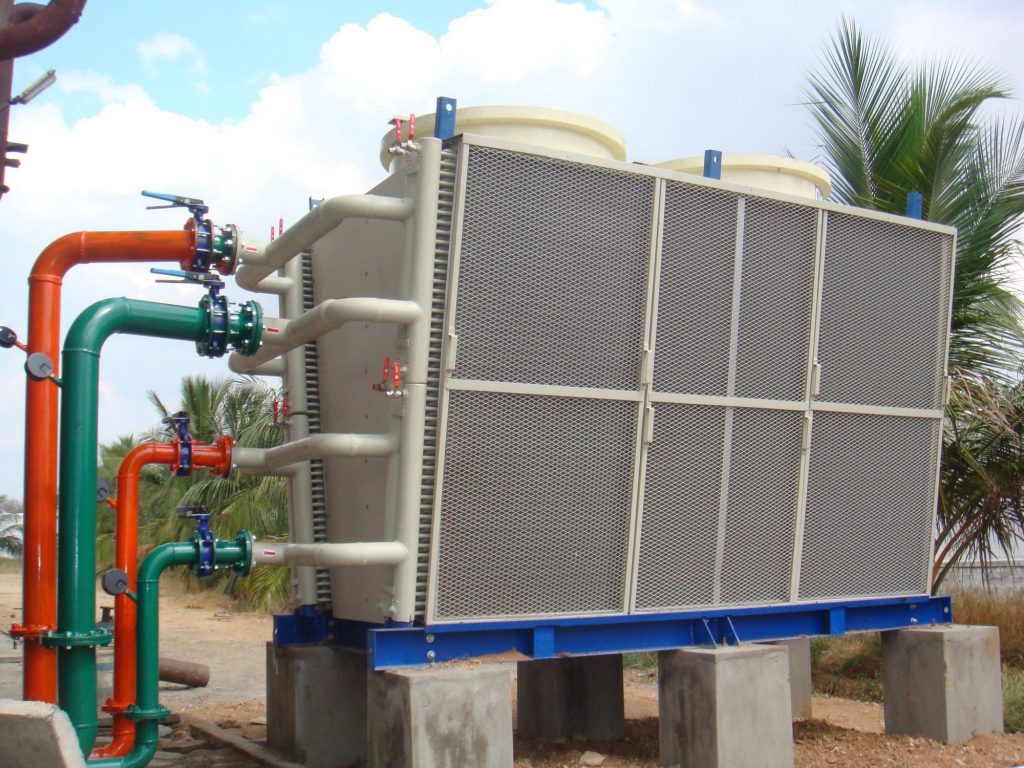Coil cooling tower, often referred to as a closed-circuit cooling tower, is a hybrid cooling device designed to remove heat from industrial fluids without exposing them to the external environment. It uses a sealed coil heat exchanger where the process fluid circulates, while water is sprayed over the coil and air is drawn through the tower to facilitate heat rejection through evaporative cooling and air convection.
Why Coil Cooling Towers are Different and Valuable
Unlike open-type cooling towers, where the fluid being cooled is directly in contact with the air and spray water, coil cooling towers completely isolate the process fluid. This makes them highly reliable in processes where:
- Fluid contamination must be avoided.
- Toxic or chemically reactive fluids are used.
- Operational downtime and maintenance are costly.
- System cleanliness is mission-critical.
Benefits & Features
Closed-Loop Fluid Circuit
- The process fluid never contacts the atmosphere or external spray water.
- Protects sensitive fluids like refrigerants, brine solutions, glycol mixtures, or specialty chemicals.
- Prevents oxidation, scaling, bacterial growth, and dilution of the process fluid.
Evaporative & Sensible Cooling Combined
- The hot process fluid transfers heat to the coil wall.
- Spray water removes heat from the coil surface through evaporation — a highly efficient cooling method.
- Airflow over the wetted coil surface accelerates cooling via forced convection.
- The balance between these two mechanisms allows for high thermal efficiency per unit footprint.
Dual-Mode Operation (Wet & Dry Cooling)
- In hot weather, the tower operates in wet mode, using spray water and air.
- In colder months, the spray system is turned off, and the tower operates like a dry air cooler, relying solely on ambient air.
- This seasonal adaptability significantly reduces water consumption and lowers operating costs.
Special Industry Applications
Some niche uses where coil cooling towers are preferred over open towers:
- Data centers for critical equipment cooling without fluid contamination.
- Battery manufacturing plants handling corrosive electrolyte solutions.
- Cold storage warehouses using refrigerants like ammonia or freon that must remain sealed.
- Breweries and food-processing plants where hygiene and water purity standards are high.
- Medical device manufacturing where precision cooling of process liquids is vital.
Key Performance Considerations
- Coil cooling towers generally achieve lower approach temperatures (difference between fluid outlet temperature and ambient wet-bulb temperature) compared to air-cooled systems.
- Can be designed for higher operating pressures and temperatures than standard open cooling towers.
- Modular design options available, allowing capacity upgrades or maintenance without shutting down the entire system.
Coil cooling towers present a highly efficient, low-maintenance, and reliable cooling solution for modern industrial facilities where process fluid purity, operational flexibility, and energy efficiency are top priorities. Their dual-mode operation, compact footprint, and adaptability make them increasingly popular in industries with stringent process requirements and environmental goals.
